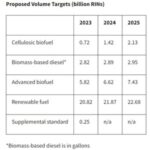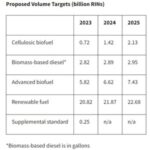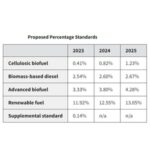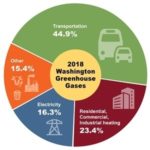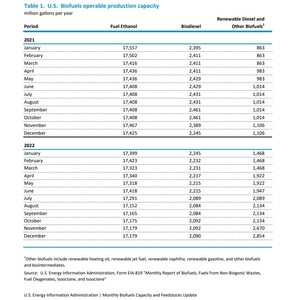EPA issues RFS RVO proposed rule, proposes to deny SRE petitions
Energy Disrupter
ADVERTISEMENT
The U.S. EPA on Dec. 7 released a proposed rule to revise 2020 Renewable Fuel Standard renewable volume obligations (RVOs) and set long-overdue RVOs for 2021 and 2022. In a separate action, the agency is proposing to deny more than 60 small refinery exemption (SRE) petitions.
“Despite multiple challenging dynamics affecting the RFS program in recent years, EPA remains committed to the growth of biofuels in America as a critical strategy to secure a clean, zero-carbon energy future,” said EPA Administrator Michael S. Regan. “This package of actions will enable us to get the RFS program back in growth mode by setting ambitious levels for 2022, and by reinforcing the foundation of the program so that it’s rooted in science and the law.”
For 2020, the EPA is proposing to reduce the total RVO for renewable fuel to 17.13 billion gallons, down from 20.09 billion gallons as finalized in late 2019. The nested RVO for advanced biofuel would be set at 4.63 billion gallons, down from 5.09 billion. The RVO for biomass-based diesel would be maintained at 2.43 billion gallons, while the cellulosic biofuel RVO would be set at 510 million gallons, down from 590 million gallons. The agency said it is proposing to revise 2020 RVOs to account for challenges the program and the market faced during the year, including from the COVID-19 pandemic.
On a percentage basis, the EPA estimates that the 2020 RVO would be set between 10.78 percent and 11.36 percent for total renewable fuel, including between 2.91 percent and 3.07 percent for advanced biofuel, between 2.37 percent and 3.5 percent for biomass-based diesel, and between 0.32 percent and 0.34 percent for cellulosic biofuel. The low percentage ranges do not include any projected exempted gasoline and diesel volumes for SREs, while the high values include 8.19 billion gallons of projected exempted gasoline and diesel from SREs. The original percentage standards for 2020 were finalized at 11.56 percent for total renewable fuel, including 2.93 percent for advanced biofuel, 2.1 percent for biomass-based diesel, and 0.34 percent for cellulosic biofuel.
For 2021, the EPA is proposing to set the RVO for total renewable fuel at 18.52 billion gallons, including 5.2 billion gallons of advanced biofuel, 2.43 billion gallons of biomass-based diesel, and 620 million gallons of cellulosic biofuel. The EPA said the 2021 RVOs are being proposed at the level the agency projects the market will use by the end of this year.
For 2022, the EPA is proposing to set the RVO for total renewable fuel at 20.77 billion gallons, including 5.77 billion gallons of advanced biofuel, 2.76 billion gallons of biomass-based diesel, and 770 million gallons of cellulosic biofuel. The agency is also proposing to add a 250-million-gallon supplemental obligation and has stated its intent to add another 250-million-gallon supplemental obligation in 2023. The supplemental obligations would address the remand of the 2014-2016 annual rule by the D.C. Court of Appeals in Americans for Clean Energy v. EPA. The agency said spreading the obligation over two years would provide the market time to respond to the supplemental obligation.
On a percentage basis, the 2021 RVO for total renewable fuel would be between 10.79 percent and 11.33 percent, including between 3.03 percent and 3.08 percent advanced biofuel, between 2.19 percent and 2.3 percent biomass-based diesel, and between 0.36 percent and 0.38 percent cellulosic biofuel. For 2022, the percentage standard for total renewable fuel would be set between 11.76 percent and 12.33 percent, with between 3.27 percent and 3.42 percent advanced biofuel, between 2.42 percent and 2.54 percent biomass-based diesel, and between 0.44 percent and 0.46 percent cellulosic biofuel. The supplemental obligation for 2022 would be set between 0.14 percent and 0.15 percent. As for in 2020 proposals, the low percentage ranges for 2021 and 2022 do not include any projected exempted gasoline and diesel volumes for SREs, while the high values include 8.19 billion gallons of projected exempted gasoline and diesel from SREs.
The proposed rule also updates and re-proposes a provision originally included in the long-stalled Renewables Enhancement and Growth Support rule to allow for the production, transfer and use of biointermediates to generate qualifying fuel under the RFS program. When compared to the REGS rule, the proposed biointermediates provisions include changes to the definition of biointermediate, limits on biointermediate transfers, and mandatory participation in the RFS Qualify Assurance Program. The EPA is also proposing changes to the compliance and enforcement provision, including new product transfer document requirements for RINs generated from renewable fuel produced from biointermediates; changes to the registration, reporting, recordkeeping and attest engagement requirements; and provisions for the treatment of invalid RINs generated from biointermediates.
The proposed rule also includes a variety of other provisions, including to change the biomass-based diesel weighting factor from 1.50 to 1.55, changes to registration for baseline volumes, changes to attest engagements for parties owning renewable identification numbers (RINs), the treatment of confidential business information, clarifying the definition of agricultural digesters, adding a definition of “produced from renewable biomass,” and several other changes and minor corrections.
In a separate RFS action, the EPA is proposing to deny more than 60 pending SREs from small refineries seeking exemptions from the RFS program for one or more compliance years between 2016 and 2021. The agency said the proposed decision results from its review of the pending SRE petitions and supporting information, its legal, technical and policy analysis of the Clean Air Act provisions related to small refineries, and its application of the holding of the U.S. Court of Appeals for the Tenth Circuit in Renewable Fuels Association et al. v. EPA.
A public comment period on the proposed RVO rule is open through Feb. 4. A virtual public hearing is scheduled for Jan. 4, with an additional session held Jan. 5, if necessary, to accommodate the number of testifiers that sign-up to testify. A separate comment period on the proposed denial of SRE petitions will be open for 30 days following publication of that proposal in the Federal Register.
The Renewable Fuels Association criticized the EPA’s proposal to retroactively reduce 2020 RVOs, but stressed that the proposed 2021 and 2022 RVOs along with the proposed action to deny more than 60 SRE petitions is a “step in the right direction.”
“Over the past four years, RFA has led the charge to stop the previous EPA’s illegal abuse of the small refinery waiver provision,” said Geoff Cooper, president and CEO of the RFA. “We commend EPA Administrator Michael Regan and the Biden administration for denying all pending small refinery exemptions, and we are extremely pleased to see the Agency shutting the floodgates on these destructive waivers. Under the previous administration, these exemptions destroyed demand for more than 4 billion gallons of renewable fuel, resulting in higher fuel prices for the consumer, increased GHG emissions, and lower farm income. Today’s announcement should finally put an end to the rampant abuse of the exemption program that we experienced under the last administration.”
“While we are pleased to see that EPA’s proposal for 2022 is consistent with Congressional intent to require 15 billion gallons of conventional renewable fuels like corn ethanol, it would be completely unprecedented—and contrary to EPA’s past policies and practices—for the agency to go back in time and revise the 2020 RFS requirements,” he added. “The 2020 volumes were finalized nearly two years ago. Revising them now would undermine investment, create uncertainty, and go against EPA’s long-standing position that it does not have the authority to change RVOs once they are finalized.
“We recognize that the previous administration left the RFS program in total disarray when it departed Washington, and today’s package from EPA marks an important step toward finally putting the RFS back on track,” Cooper continued. “However, today’s proposals do not quite get us all the way there, and more work is needed to ensure the RFS drives maximum growth in the production and use of low-carbon renewable fuels. RFA and our allies in the farm community will engage with EPA and actively pursue improvements to these proposals during the public comment period.”
Growth Energy called the EPA’s proposals a “mixed bag for the biofuels industry,” criticizing the proposed revision of 2020 RVOs and the low level of proposed 2021 RVOs, but indicating support for the 2022 proposal and the agency’s plan to deny more than 60 pending SREs.
“EPA’s projection of strong biofuel blending requirements in 2022, commitment to halt illegal refinery exemptions, and long-awaited progress toward complying with a 2017 court order on lost gallons represent a welcome step forward,” said Emily Skor, CEO of Growth Energy. “These forward-looking plans underscore the critical role biofuels play in mitigating climate change and lowering prices at the pump. However, we are extremely disappointed EPA has proposed rolling back requirements for 2020 and lowering volumes for 2021.
“Retroactive cuts to 2020 blending requirements impact the entire fuel supply chain, including the farmers, producers, blenders, retailers, and responsible refiners who based business decisions on final requirements in place for some time.
“This unprecedented move not only exceeds EPA’s legal authority under the RFS, it fails to recognize the law’s built-in mechanism that adjusts requirements when fuel demand differs from original projections,” she added. “At face value, the EPA’s plan for 2020 gallons serves as a giveaway to petroleum companies at the expense of rural families and future investment in low-carbon energy.
“On the campaign trail, President Biden committed to strengthening the rural economy and addressing climate change with a strong RFS and we hope to see the president’s promises fully reflected in the final rule. We look forward to engaging with the EPA during the comment period to get the RFS fully back on track.
“The Biden Administration simply cannot meet its climate goals while retroactively rolling back low-carbon biofuel blending requirements to help oil refiners,” Skor continued.
The National Biodiesel Board welcomed the long overdue proposed RVOs, but noted the EPA is not providing guidance on the 2023 RVO for biomass-based diesel, which was due under statute on Nov. 30, 2021.
“During the past two years’ economic challenges, our industry worked hard to meet growing U.S. demand for cleaner, better fuels,” said Kurt Kovarik, vice president of federal affairs at the NBB. “We are confident that we can continue to grow and innovate to meet additional market needs. EPA’s rule provides some growth for advanced biofuels in 2022 and we hope puts an end to the demand destruction that resulted from unwarranted small refinery exemptions. We look forward to working with the agency to getting the RFS back on track. And we greatly appreciate the economic relief and incentives for infrastructure that USDA is announcing.
“The long delay in setting 2021 volumes is a missed opportunity,” Kovarik continued. “Moreover, EPA is setting a bad precedent by recalculating the 2020 obligations. The retroactive lowering of volumes creates uncertainty about future growth.”
The Coalition for Renewable Natural Gas (RNG Coalition) is speaking out in support of the proposed 2022 RVO for cellulosic biofuel. “We welcome EPA issuing proposed RFS volume requirements providing for a 51 percent increase in the program’s cellulosic biofuel target between 2020 and 2022,” said Johannes Escudero, founder and CEO of the RNG Coalition. “EPA’s continued support for the expanded production and use of RNG is much appreciated. As this process moves ahead, we look forward to working constructively with the Biden administration to finalize the 2021 and 2022 standards as soon as possible and make further improvements to the proposal.”
The RFS Power Coalition criticized the EPA for failing to take action on eRINs as part of its proposed rule. “The hardworking men and women at biomass, biogas and other renewable power facilities across the country remain hopeful that the EPA will include electricity in the RFS as soon as next year,” said Carrie Annand, executive director of Biomass Power Association. “Aside from following the law, enacting the electricity portion of the RFS will support a very important part of the renewable energy industry. Increased electrification means an increased need for 24/7 baseload electricity. Biomass and biogas fulfill this need with negligible carbon emissions compared to coal and natural gas.”
“We continue to be extremely disappointed that EPA continues to fail to recognize renewable electricity from biogas in its volumes for now the seventh year in a row,” said Patrick Serfass, executive director of the American Biogas Council. “We implore EPA to take action quickly to approve the dozens of projects already registered and revise the RVO for cellulosic biofuel upward to recognize this additional renewable fuel production.”
The Iowa Renewable Fuels Association called the proposed ROVs a missed opportunity to lower fuel prices and carbon emissions. “The proposed rule from the Biden EPA falls woefully short of any attempt to leverage domestic biofuels to help lower fuel prices and carbon emissions,” said Monte Shaw, executive director of the IRFA. “We also have serious concerns it likely violates the RFS law, especially with regard to the 2020 actions. Why on Earth should the United States be asking OPEC for more oil and releasing our strategic petroleum reserves while at the same time proposing to undermine the one and only law on the federal books that seeks to expand domestic fuel supplies that reduce carbon emissions. We urge President Biden to step in and provide a course correction to his EPA in order to realign this proposed rule with his commitments to Iowa voters.”
“The Biden EPA’s proposal to reopen the finalized 2020 rule is ill conceived, illogical, and, we believe, illegal,” he added. “The EPA has long maintained it does not have the authority to reopen a final RVO rule and we agree. Further, the self-correction mechanisms in the RFS have already adjusted the biofuels requirement for 2020 down to account for COVID-related reduced gasoline use. Adjusting the 2020 levels down further is biofuel demand destruction pure and simple.
“Further, the 2021 number was reduced well below actual blending,” Shaw continued. “That’s unfathomable and, if allowed to stand, would blow apart the many commitments President Biden made to Iowa voters when running for president. We have not forgotten that Biden said the RFS ‘marks our bond with our farmers and our commitment to a thriving rural economy.’ We urge President Biden to ensure the final rule lives up to his promise.”
The Advanced Biofuels Association welcomed the proposed actions. “On behalf of the members of ABFA we are pleased with the release of the RVO mandate prior to the end of the year,” said Michael McAdams, president of the ABFA.” In society’s collective goal to reduce carbon in our future, ABFA members stand ready to increase the number of gallons of advanced biofuels products that exceed the minimum 50 percent carbon reduction requirement. With a particular focus on heavy duty diesel, marine fuels, heating oil, as well as aviation, we are on a mission to reduce carbon in the future.
“Releasing the RVO today, will help us plan for the coming year and sends some clear signals of support for our industry,” McAdams added. “We are supportive and grateful for the manner in which the EPA addressed the issue of small refinery exemptions going forward by deny the pending exemptions. As ABFA argued going back to 2018, the manner in which these were doled out in 2018, 2019, and 2020 was unprecedented and undercut the purpose of the RFS program.”
The Advanced Biofuels Business Council praised the proposed SRE action but criticized the EPA’s proposal to revise the 2020 RVO. “President Biden ran on a promise to stand up to the oil industry and protect jobs in the U.S. biofuel industry,” said Brooke Coleman, executive director of the ABBC. “This proposal signals a possible end to the era of oil refinery waiver abuse, an embrace of new fuels, and biofuel market growth in 2022 — clear steps in the right direction. But if we’re going to unleash the full potential of the RFS, the retroactive cuts need to stop. It’s time to make a clean break from the same, old political games we see every year from refiners betting against clean energy and focus on creating a new wave of clean energy jobs across America’s heartland.”
Poet LLC criticized the proposed rule and called on President Biden and the EPA to get the RFS back on track. “EPA’s draft rule would reduce access to the single most affordable and abundant source of low-carbon liquid fuel on the planet right at the moment when consumers are facing high gas prices, and political leaders are grasping for climate solutions that are within reach,” said Joshua Shields, senior vice president of government affairs and communications at Poet. “The Biden Administration should fulfill the President’s campaign promises to support the Renewable Fuel Standard, which will continue to affordably decarbonize the nation’s existing vehicle fleet, create clean energy jobs and support American farmers. We urge the EPA to consider the consequences of reducing biofuel volumes, reinstate robust blending targets and, as the President said, ‘Get the RFS back on track’ before the rule is finalized.”
The Iowa Soybean Association and Iowa Biodiesel Board applauded the proposed 2022 RVOs, but urged the EPA not to move forward with retroactive reductions to the 2020 RVO.
“Iowa soybean farmers welcome the EPA’s announcement to improve 2022 biofuel volumes and expand biofuel infrastructure,” said Robb Ewoldt, president of the ISA. “These decisions not only send a clear message to growers, but further demonstrates the important role homegrown energy plays in expanding rural vitality and meeting carbon emission goals outlined by the Biden Administration.
“While farmers remain optimistic in light of these biofuel investments, the agency should not ignore the reservations made by growers caused by volume delays in recent years,” he continued. “Producers will continue to urge the EPA to make timely announcements outlining future plans and volume decisions to ensure confidence in the RFS program moving forward.”
“Overall, we are pleased with the EPA’s proposal, which provides growth for advanced biofuels like biodiesel in 2022. We are also optimistic this proposal will finally shut the door on the past abuse of small refinery exemptions, which came at the expense of the biofuels industry,” said Grant Kimberley, executive director of the IBB and senior director of market development at the ISA. “On the downside, this proposal’s timing was badly delayed, putting our industry in a difficult position of uncertainty. We also have concerns that EPA is retroactively changing the volume requirements of 2020, and sincerely hope that this is a one-time situation. However, the COVID relief for biofuels producers from USDA is greatly appreciated and will hopefully help offset economic harm from the lost volumes. The additional infrastructure dollars for biofuels are also needed and welcomed.
“With climate change and carbon reduction stated as an urgent national priority, it is gratifying to see biodiesel recognized as part of the solution,” Kimberley added. “Biodiesel is the best chance to reduce lifecycle carbon dioxide emissions right now, rather than waiting decades, especially for heavy-duty trucks, likely among the last to decarbonize. Now is the time to fully realize the benefits biodiesel provides to our environment and economy, and our state stands ready to deliver.”


